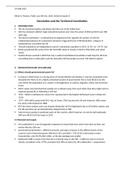29 Sept 2021
Elliott & Thomas, Public Law (4th ed, 2020, Oxford) chapter 8
Devolution and the Territorial Constitution
1. INTRODUCTION
The UK remained largely centralised until the turn of the millennium
SCO has retained a distinct legal and judicial system ever since the union of ENG and SCO over 300
years ago
Territorial constitution = constitutional arrangements that regulate the powers of and the
relationships between its component elements; triggered by the 1998 devolution; a degree of
independence, but within the UK
‘Should Scotland be an independent country’ referendum question in 2014; 55.3% ‘no’, 44.7% ‘yes’
Brexit questioned the unity of the UK: SCO+NIR voted to remain in the EU, ENG+WAL and voted
‘leave’
Gordon Brown warned in 2020 that only a radical constitutional revolution could stop the UK from
unravelling due to nationalism and the alienation felt by people in poorer ‘left behind regions’
2. DEVOLUTION IN NIR, SCO AND WAL
2.1 Where should governmental power lie?
In states in which there is a strong sense of shared identity and destiny, it may be acceptable (even
desirable) for there to eb a highly centralised system of government; this is most likely to be the
case where the population of a country is homogeneous in cultural, linguistic, ethnic and economic
terms
Other states may find that their people are so distant away from each other that they might wish to
separate peacefully or following a civil war
1535 = Welsh constituencies came to be represented in the English Parliament (Law in Wales Act
1535)
1707 = ENG+WAL joined with SCO, Acts of Union 1706; became the UK and Ireland in 1800 under
the Union with Ireland Act 1800
BUT the home nations were not treated identically: UK Parl legislated only on SCO/WAL matters and
the UK executive set up administrative departments in NIR
Voters favour parties in particular parts of the country, which however, do not do well nationally;
SNP won 48/59 SCO Parl seats in 2019
2.2 Demand and supply
UK constitution is a set of pragmatic responses to issues that have arisen from time to time; not
written like the USA one
Asymmetrical devolution = different amounts and types of power in the different parts of the
country; level of devolved power differed in SCO and WAL = 74% of SCO referendum voters
favoured dev, only 50.3% did in WAL, so the dev package was smaller
Nationalist (NIR’s cession from the UK) vs Unionist (stay in the UK) = 3,000 lives lost in terrorist
attacks; escalation in the 1970s; provision that NIR can leave the UK (satisfaction + compromise)
, 29 Sept 2021
Quality of relentless pragmatism (‘reactive and piecemeal’) overlooks the need for a ‘coherent vision
for the shape and structure of the United Kingdom’
2.3 Legislative competence
SCO Parl and NIR Assembly posses general legislative competence = authorised to enact legislation
on any issue, subject to certain exceptions (specific legislation that devolved legislatures cannot
alter, e.g. HRA 1998 + areas, such as international relations and defence of the realm)
SCO and NIR legislatures cannot enact legislation conflicting EU Law and the ECHR or common law
and rule-of-law standards
SCO and NIR legislatures have lawmaking powers: amending, repealing, replacing Acts of Parl; can
pursue fundamentally different policy directions
Welsh system = was one of administrative or executive function, not a legislative one; otherwise, UK
Ministers would have exercised powers; Welsh Assembly could take on the UK Ministers’ function of
making secondary legislation
UK Supreme Court determines whether a devolved legislature has legislated within or without its
legislative competence => gone beyond legal competence? Issues are adjudicated in the Supr Ct;
however, it is not the view of the Supr Ct to express any view on questions of policy, which are the
responsibility of elected representatives and in which the wider civil society has an interest = simply
has to determine whether a devolved Bill or statute is within the legislative competence of the
relevant legislature; interpretation of the scope of power outlined in devolution statutes
2.4 ‘A Process not an event’
Term coined by Ron Davies, Secretary of State for Wales
Powers relating to justice and policing matters were transferred to Belfast in 2010 (previously, they
were not devolved)
Scotland Act 2012 extended SCO’s devolved powers following the Calman Commission’s report; Act
devolved certain taxation and borrowing powers
Scotland Act 2016 made the country fiscally autonomous of the UK to an unprecedented degree
Wales Act 2014 devolved relatively limited powers in relation to taxation, but also made provision
for a referendum to be held on empowering the Welsh Assembly to change the rates of income tax
payable by Welsh taxpayers; Wales Act 2017 removes the need for a referendum on this point and
simply authorises the Welsh Assembly to begin exercising income tax varying powers
Wales Act 2017 expands devolved competences in areas, such as energy, transport, equal
opportunities, marine licensing
Wales has a conferred, rather than a reserved powers model; reserved powers = albeit the
devolution, Westminster is the only place that can legislate on certain matters
Devolution legislation recognises the ‘permeance’ of the Scottish Parliament and Government
2.5 Executive power
Members of the Scottish Parl (MSPs) must nominate one of their number to be appointed First
Minister by the Queen; First Min then appoints the other Ministers (who are MSPs)
‘Parliamentary government’ model in SCO = an executive drawn from the legislature
The role of UK Ministers in relation to SCO is slight, given the major domestic areas of governance
(e.g. education and health) are largely devolved





